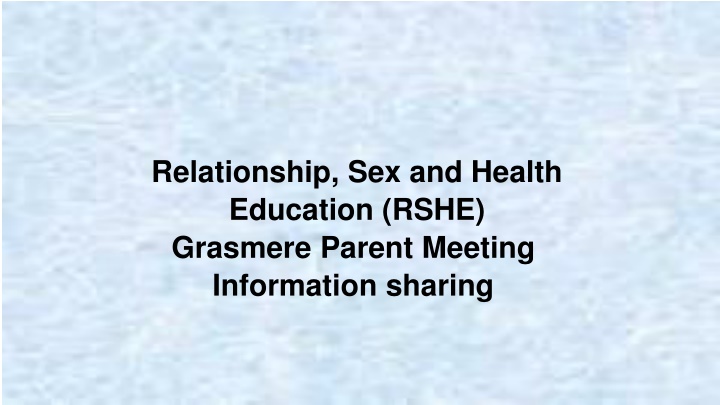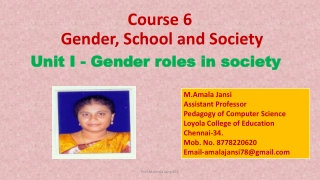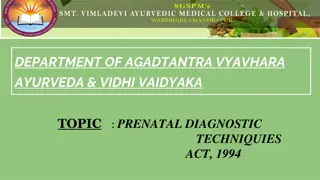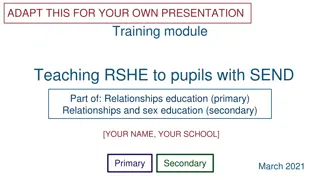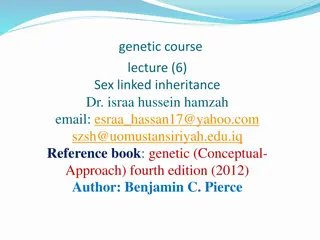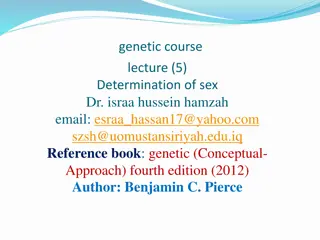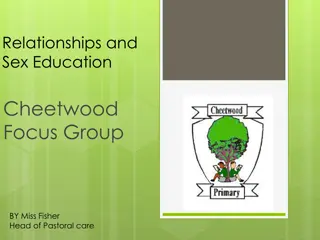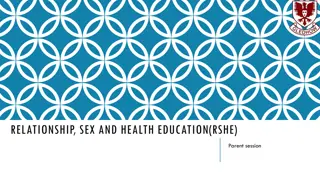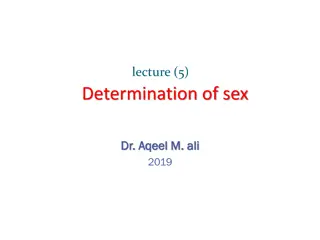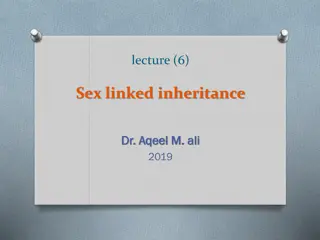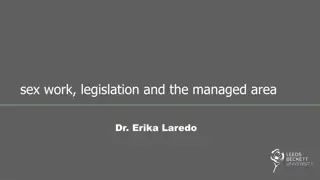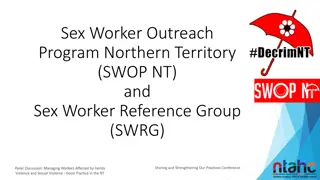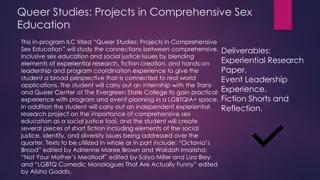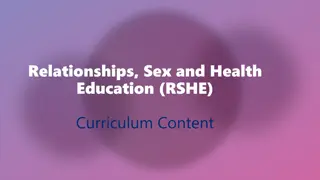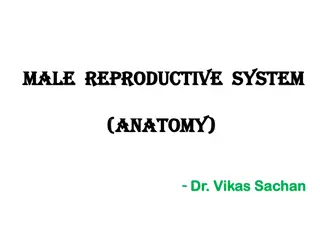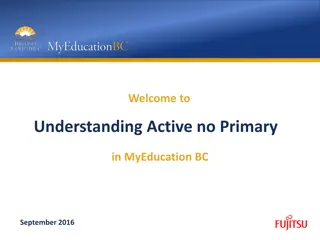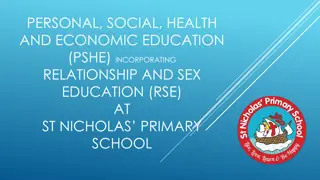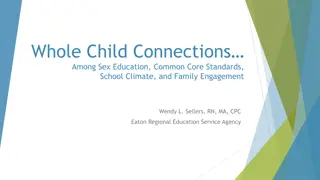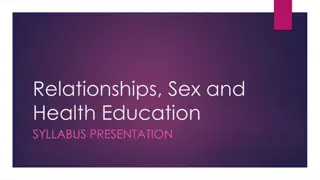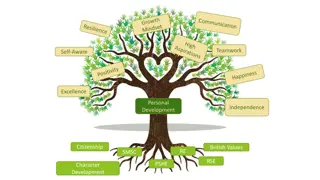Importance of Relationship, Sex, and Health Education (RSHE) at Grasmere Primary School
Grasmere Primary School values the importance of Relationship, Sex, and Health Education (RSHE) in providing pupils with essential skills and knowledge to navigate an increasingly complex world. The school aims to deliver high-quality, age-appropriate RSHE that fosters understanding, respect, and a safe environment for all students, helping them flourish not just in childhood but throughout their lives.
Download Presentation

Please find below an Image/Link to download the presentation.
The content on the website is provided AS IS for your information and personal use only. It may not be sold, licensed, or shared on other websites without obtaining consent from the author.If you encounter any issues during the download, it is possible that the publisher has removed the file from their server.
You are allowed to download the files provided on this website for personal or commercial use, subject to the condition that they are used lawfully. All files are the property of their respective owners.
The content on the website is provided AS IS for your information and personal use only. It may not be sold, licensed, or shared on other websites without obtaining consent from the author.
E N D
Presentation Transcript
Relationship, Sex and Health Education (RSHE) Grasmere Parent Meeting Information sharing
Governors should ensure that: All pupils make progress in achieving the expected educational outcomes; The subjects are well led, effectively managed and well planned; The quality of provision is subject to regular and effective self evaluation; Teaching is delivered in ways that are accessible to all pupils with SEND; Clear information is provided for parents on the subject content and the right to request that their child is withdrawn; and The subjects are resourced, staffed and timetabled in a way that ensures that the school an fulfil its legal obligations
Objectives of the meeting To explain the requirement of Relationships, Sex and Health Education. To share RSHE teaching overview. To clarify some of the misinformation regarding the RSHE curriculum.
RSHE is comprised of three main strands HEALTH AND WELLBEING - physical wellbeing, mental health, ourselves, growing and changing, keeping safe LIVING IN THE WIDER WORLD - responsibilities, communities, media and digital resilience, economic well being, aspirations, career RELATIONSHIPS - families and close positive relationships, caring friendships, respectful relationships, online relationships, being safe
Policy statement - Aims and objectives of RSHE It is the intention of Grasmere Primary School to teach high quality, age appropriate, pupil-sensitive, evidence-based RSHE, that demonstrates a respect for the law and all communities that call Hackney home. It is expected that RSHE in Grasmere Primary School will help pupils to learn about themselves and the world they live in, giving them the skills, understanding and information they need for life. This will help them to stay safe and to flourish, not just in childhood, but into adulthood and for the rest of their lives. This is why RSHE is such an important part of the curriculum
Why is RSHE important? Our children are growing up in an increasingly complex world with new opportunities, but also new challenges. We as a school, want our pupils to flourish in the world they find themselves and to work hard throughout all curriculum areas in order to give them the skills and knowledge they need to help prepare them for life RSHE teaching is an important part of equipping our pupils for life in 21st century Britain, enabling them to embrace diversity, helping them to make the most of technology; understand the importance of, and develop the skills which lead to them being able to sustain healthy and strong relationships
Equality Act 2010 Public Sector Equalities Duty 2014 Relationships and Health Education compulsory from September 2020. New regulations were passed in April 2019 1.9 It is unlawful for a school to discriminate against a pupil or prospective pupil by treating them less favorably because of their: sex, race, disability, religion or belief, sexual orientation, gender reassignment, pregnancy or maternity (DfE 2014, p8) 1.7 If a school treats bullying [against any of the groups outlined previously] less seriously then it may be guilty of unlawful discrimination (DfE 2014, p8) 3.27 Teaching should be based on facts and should enable pupils to develop an understanding of how the law applies to different relationships. Teachers must have regard to statutory guidance on sex and relationship education (now RSHE), and to meet duties under equality and human rights law (DfE. 2014)
All Schools must have an RSHE Policy Hackney schools have received support and guidance from the Borough to produce a school policy The Borough has had extensive consultation on RSHE policy including the following: Parents LGBT+ community Councilors Teachers Other places Governors & trustees - around 60 attended training at Education Space Faith groups SACRE Muslims Sunni and Shia Christians Catholic and protestant Hindu Buddhist Jewish Sikh Humanist Children SEND educational services DfE and Ofsted Head Teachers including Nursery Head Teachers - Consultation with 30 Governors who are parents - Individuals, groups and teachers who identify as LGBT+ - Briefing and consultation with around 30 - 80+ attended training, 55 attended Network Meetings - Birmingham, Redbridge and Tower Hamlets - 20 survey monkey responses and meeting held with 30 Imams - 19 different individuals representing Estimated numbers 180 pupils
Statutory Relationships Education Relationships Education The focus in primary schools should be on teaching the fundamental building blocks and characteristics of positive relationships, with family members, other children and adults. Lessons will be evidence based, age and culturally appropriate, based in the law and sensitive to the needs of pupils. There is no right to withdraw from Relationships Education
Statutory Relationships Education What Pupils will learn? Relationships Education will put in place the building blocks needed for positive and safe relationships including with family, friends and online. Children will be taught what a relationship is, what friendship is, what family means and who can support them. In an age appropriate way, we will cover how to treat each other with kindness, consideration and respect. Accept and respect diversity among others and foster a positive approach to differences. Characteristics of healthy family life and that other people s families sometimes look different from theirs. (Families can include for example, single parent families, LGBT parents, families headed by grandparents, adoptive parents, foster parents and carer s amongst other structures). What makes a healthy relationship, and how to build strong, respectful relationships with others in their life, e.g. family, friends, colleagues Recognise if relationships are making them feel unhappy and unsafe, and how to seek help if needed. Rules and principles for keeping safe online. Why teach it? In such an ever-changing world where young people are exposed to so much online, they need to be taught how to be safe and healthy, and how to manage their academic, personal and social lives in a positive way.
Will my child be taught about LGBT relationships?. Pupils should be taught about the society in which they grow up. These subjects are designed to foster respect for others and for difference, and educate pupils about healthy relationships. Pupils should receive teaching on LGBT content during their school years. Teaching children about the society we live in and the different types of loving healthy relationships that exist can be done in a way that respects everyone. We will cover LGBT content when teaching about different types of families.
Statutory Health Education Health Education (Physical Health and Mental Wellbeing) The aim of Health Education is to give pupils the information that they need to make good decisions about their physical and mental health and wellbeing. Pupils will recognise what is normal and what is an issue in themselves and others, and how to seek support at the earliest stage from appropriate sources. Puberty, including menstruation, will be covered in Health Education and should, as far as possible, be addressed before children begin puberty.
Statutory Health Education What Pupils will learn? Characteristics of good physical health and mental wellbeing. How to make good decisions about their own health and wellbeing. Healthy Eating Facts and risks associated with drugs, alcohol and tobacco. Basic First Aid To recognise issues in themselves and others, and to seek support as early as possible when issues arise. Changing adolescent body Digital detox and the risks of excessive use of electronic devices. How to stay safe online and equipped to manage common difficulties encountered online. Why teach it? A firm foundation in the benefits and characteristics of good health and wellbeing will enable teachers to talk about isolation, loneliness, unhappiness, bullying and the negative impact of poor health and wellbeing
Non-Statutory Requirements The Government and local advisors strongly recommend that Grasmere Primary School, after consultation with parents/carers, teaches Sex Education beyond that taught within the science curriculum. The school plans to teach about how a baby is conceived and is born in year 6 following on from the national science curriculum, which teaches about Sexual Reproduction in mammals in year 5. Sex education at Grasmere Primary School will be taught by class teachers in age appropriate and mixed gender groupings; in a sensitive way which we believe will help to ready children for their move to secondary school.
Why teach Sex Education in Primary School ? A recent consultation of Secondary school students has seen 63% of year 10s say that they think that pupils should learn how a baby is made and born at primary school age. We believe that by teaching this topic here, it will help to equip our pupils for the transition to secondary school where they may learn about sex from less reliable sources such as friends or older children in the playground. Our intention is to make these lessons as sensitive to the background of all our pupils as possible and our hope is that they will all remain in the lesson so that they learn facts from a teacher rather than second-hand in the playground
Will my child be taught Sex Education in Primary School ? This is too young . We are not introducing compulsory Sex Education. We are introducing Relationships Education, to put in place the building blocks needed for positive and safe relationships of all kinds. We will start with family and friends, how to treat each other with kindness, and recognizing the difference between online and offline friendships. The lessons will be tailored to the age, physical and emotional maturity of the pupils.
Withdrawal from Sex Education Under the Education Act 1993 parents can withdraw pupils from part of the sex education that is outside the compulsory elements contained in the science National Curriculum. Parents wanting to exercise this right are invited to see the Head teacher. She will listen to the concerns of the parents and will discuss any impact that withdrawal may have to the child. She will talk with the parents about the child s possible negative experiences or feelings that may result from exclusion and the ways in which these can be minimized. Once a child has been withdrawn they cannot take part in sex education for that unit, until the request for withdrawal has been removed. Parents have the right to withdraw from sex education.
Monitoring Evaluation and Assessment To ensure that the teaching and learning in RSHE in our school is of the highest standard, it will be monitored by our RSHE curriculum leader and by senior leaders in the school. The school will identify pupils prior knowledge through: questioning and discussions with the children during their lessons. This is important in order to ensure: resources are being used effectively and lessons are having an impact on the children s understanding and development so they are ready for the next stage of their education.
National Curriculum Science At key stages 1 and 2, the national curriculum for Science includes teaching about the main external parts of the body and the changes to the human body as it grows from birth to old age, including puberty, and sexual and asexual reproduction in mammals and plants. There continues to be no right to withdraw from national curriculum science.
Safeguarding Safeguarding is an important aspect of all of the lessons taught as part of RSHE in our school. Our safeguarding policy will be applied to and supported by all aspects of RSHE and any disclosures or issues arising as part of RSHE, will be dealt with in line with our safeguarding policy.
The aims of RSHE mirrors the three statutory aims of the National Curriculum, to enable all young people to become: successful learners who enjoy learning, make progress and achieve confident individuals who are able to live safe, healthy and fulfilling lives responsible citizens who make a positive contribution to society.
How will RSHE be taught at Grasmere Primary? We will be teaching RSHE, which will be embedded within our PSHE curriculum, using a comprehensive scheme of work called Medway Council from the PSHE Association . This consists of the following units for each year group. Elements of Sex Education will only be taught in year 5 and 6.
Myths Myth 1. Schools are teaching children to have sex As part of RSHE in some primary schools and as part of science in all secondary schools, children and young people are taught about human reproduction, but schools are not teaching or encouraging children or young people to have sex. Schools are giving them the skills and knowledge to make intelligent healthy decisions when they do decide to have sex, in line with their own morality, beliefs and their aspirations for their future. Research has shown (Sell 2019) that school is seen as a trusted source of RSHE for young people. It is important to give them the tools which mean they have the confidence and knowledge to say no to sex, or yes, or not now, maybe in the future. For some that may not be until they are married or much later in their life.
Myths Myth 2. Schools are teaching children to masturbate However, schools may talk about wet dreams and erections as part of puberty, especially for the boys who may become aware of these changes to their bodies but in year 5/6. Myth 3. No one considers the religious beliefs when teaching RSHE Schools should be mindful of all their pupils backgrounds when teaching RSHE, whatever that may be. In Hackney, because of our commitment to respecting differing faith groups, the borough s has a commitment to faith-sensitive and student-sensitive RSHE. It is important that whilst faith is respected and also talked about in RSHE, so are other belief systems, and RSHE should be sensitive to pupils or students from all differing backgrounds.
Myths Myth 4.Schools are promoting LGBT+ relationships Schools should not be advocating LGBT+ relationships over any other relationship. However, they will be talking about LGBT+ relationships and families in an age-appropriate way in RSHE. All people and loving families, including those who are LGBT+, have much to give society. Schools have a duty to present modern British society and educate children and young people about diversity, inclusion, and equality for all groups, including faith groups, as mentioned in the Equality Act 2010. Pupil- and student-sensitive RSHE can also be used to make sure other children and young people from minority groups not mentioned in the 2010 Act are included and valued too; children such as looked after children
Myths Myth 5. Schools are sexualising children at too young an age Schools need to think carefully about what they teach children and young people, making sure it is age appropriate. Knowing the context of our pupils lives, what they see and hear around them, as well as keeping them safe, are big drivers for schools. Safeguarding children and young people is a very important element of RSHE. An example of how schools can help children express themselves clearly is the use of accepted shared language, the words vulva and penis as external organs do not lead to a child understanding a sexual act, but does give them an easily understood, common vocabulary should they need to explain something in everyday life or something that has happened to them that they did not like. Parents/Carers are of course able to use family names for various parts of their body at home, but in schools proper or scientific words will be used.
Science Key Stage 2, pupils will: Be taught about different types of reproduction, including sexual and asexual reproduction in plants and sexual reproduction in animals. Pupils should draw a timeline to indicate stages in the growth and development of humans. They should learn about the changes experienced in puberty Year 5 pupils should be taught to: Describe the life process of reproduction in some plants and animals. Describe the changes as humans develop to old age. Year 6 pupils should be taught to: Recognise that living things produce offspring of the same kind, but normally offspring vary and are not identical to their parents This content Links to RSE
Preparing to teach SRE. Creating a safe environment: (For Pupils and Staff) This helps pupils feel comfortable about sharing feelings, exploring values and attitudes, expressing opinions, and considering the views of others without fear of negative feedback. Ground Rules: Respecting what people say. Listening to others Not asking personal questions or putting people on the spot Not making assumptions about other people Having the right to pass if you don t want to comment. Ask-it Basket: A question box encourages pupils to ask questions with anonymity and without embarrassment.
Relevant Documents The following documentation will be visible on our school website for our Parents/Carer s: RSHE policy The Science Programmes of Study Key Stage 1 and 2 The Medway Council scheme overview including lesson plans and schemes of work. Today s presentation to parents/carer s. https://www.grasmere.hackney.sch.uk/
https://www.gov.uk/government/news/relationships-education-relationships-and-sex-education-rse-https://www.gov.uk/government/news/relationships-education-relationships-and-sex-education-rse- and-health-education-faqs Schools will be required to consult with parents when developing and reviewing their policies for Relationships Education and RSE, which will inform schools decisions on when and how certain content is covered. Effective engagement gives the space and time for parents to input, ask questions, share concerns and for the school to decide the way forward. Schools will listen to parents views, and then make a reasonable decision as to how they wish to proceed. When and how content is taught is ultimately a decision for the school.
Questions Any questions - Please email: info@grasmere.hackney.sch.uk - We will follow up with every parent who has emailed a question either by telephone or a written response. - These will form a FAQ document which will be shared with parents.
